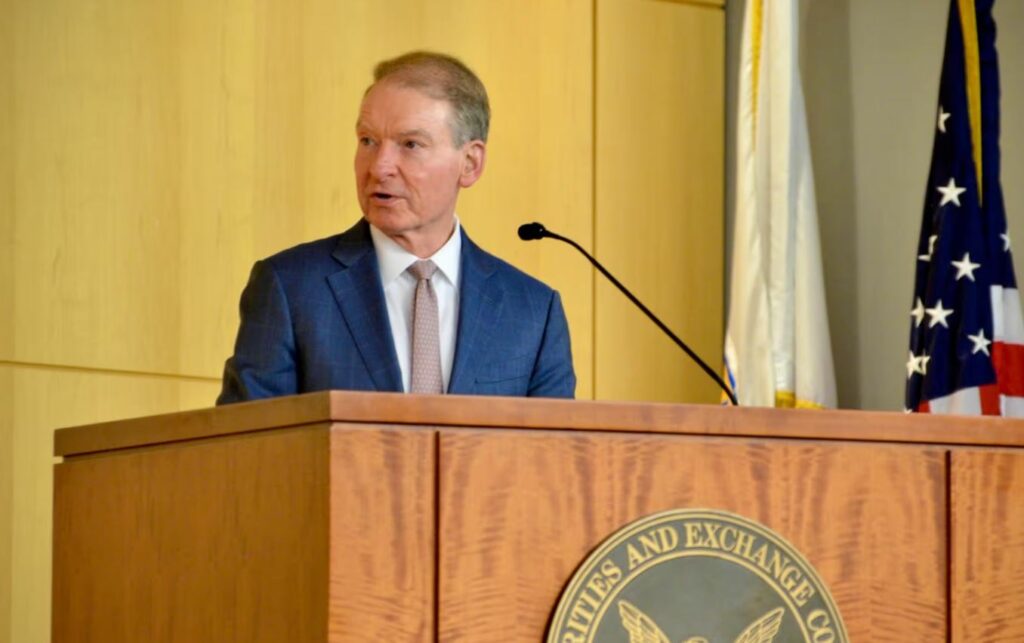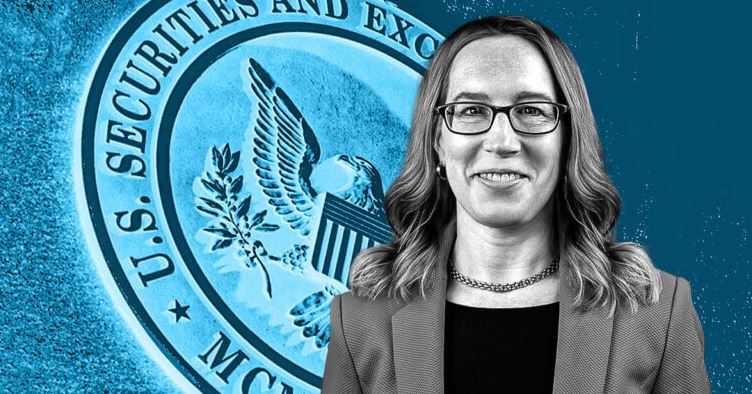
May 13, 2025 – In a significant shift for the U.S. cryptocurrency landscape, newly appointed SEC Chair Paul Atkins has announced plans to introduce a clearer regulatory framework for crypto tokens. Speaking during the opening of a public meeting of the SEC’s crypto task force on May 12, Atkins emphasized the need for updated rules that support innovation while protecting investors from fraud and abuse.
Paul Atkins, who officially took office last month, made it clear that shaping the future of digital assets will be a top priority during his tenure. He committed to creating transparent, consistent regulations around token issuance, custody, and trading. This comes after years of confusion and conflict between crypto firms and U.S. regulators over the classification and treatment of digital assets.

A Clearer Path for Token Distribution
One of the key points in Atkins’ remarks was the introduction of new guidelines for distributing crypto tokens that are considered securities. The SEC currently treats many digital tokens as securities, meaning they must follow strict rules, including registration and disclosure requirements. However, the crypto industry has long argued that many of these tokens behave more like commodities than traditional securities.
SEC Chair Atkins said the agency would look into whether new exemptions are needed to allow more flexibility for crypto projects that want to distribute tokens without triggering full securities compliance. The aim is to avoid stifling innovation while still holding bad actors accountable.
“A key priority of my chairmanship will be to develop a rational regulatory framework for crypto asset markets,” Atkins stated. “We need clear rules for the issuance, custody, and trading of crypto assets while continuing to discourage bad actors from violating the law.”
Broker-Dealers May Be Allowed to Trade Non-Securities
Paul Atkins also signaled potential changes to how registered broker-dealers operate in crypto markets. Currently, these firms can trade securities under regulated systems known as Alternative Trading Systems (ATS). However, under existing rules, they are not allowed to handle crypto assets that are not classified as securities, such as Bitcoin and Ethereum, the two largest cryptocurrencies by market cap.
To address this, SEC Chair Paul Atkins said the SEC is considering tweaks to its ATS rules, which would allow registered platforms to trade both securities and non-securities. If enacted, this change would open the door for traditional financial firms to offer a wider range of digital asset services, creating more options for investors and enhancing market liquidity.
Keeping Politics Out of Crypto Oversight
Since taking office, the SEC Chair has consistently stressed the importance of keeping politics out of securities regulation, especially when it comes to crypto. Under his leadership, the SEC aims to focus on law, fairness, and economic growth rather than partisan agendas.
This is a notable shift from the previous administration. During President Joe Biden’s term, the SEC filed lawsuits against several major crypto companies, including Coinbase and Kraken, for allegedly violating federal securities laws. These actions were widely seen as part of a broader regulatory crackdown on the crypto sector.
Now, under President Donald Trump, who has declared himself the “crypto president,” the agency is changing course. The Trump administration has promised to reverse or pause most of the enforcement actions initiated by the previous SEC leadership. Many of these cases are now either being withdrawn or temporarily halted.
Hester Peirce Leads SEC’s Crypto Task Force
Supporting Paul Atkins’ reform agenda is Republican Commissioner Hester Peirce, a well-known crypto advocate often referred to as “Crypto Mom” within the industry. Peirce is currently leading the SEC’s crypto task force, which is responsible for developing new rules and offering guidance for the digital asset space.
Peirce has long argued for more regulatory flexibility, particularly when it comes to how the SEC defines and handles token projects. She has pushed for safe harbor provisions that would allow crypto startups time to build their networks without fear of immediate enforcement.
Together, SEC Chair Paul Atkins and Peirce represent a major philosophical shift in how the SEC approaches digital assets, moving from aggressive enforcement toward a more collaborative and adaptive regulatory model.

Industry Reaction and What Comes Next
The crypto industry has welcomed Atkins’ remarks, seeing them as a sign that the regulatory environment is finally evolving to meet the unique nature of blockchain technology. Leaders from various blockchain companies have called for a framework that supports responsible innovation rather than punishing experimentation.
However, critics warn that loosening enforcement too much could lead to a rise in fraud and investor harm, especially as more unregistered projects flood the market. They argue that maintaining strict rules is essential to protect retail investors from scams and unstable token schemes.
Despite the ongoing debate, one thing is clear: the U.S. is heading into a new phase of crypto regulation. With Atkins at the helm, the SEC appears committed to crafting rules that reflect the modern financial ecosystem, without sacrificing investor protection.
Conclusion
Chairman Paul Atkins’ May 12 remarks mark a turning point for how the U.S. regulates digital assets. By promising new rules for token distribution, exploring expanded permissions for broker-dealers, and emphasizing non-partisan oversight, Atkins is steering the SEC toward a more balanced and pragmatic approach to crypto.
With millions of Americans now investing in cryptocurrencies, the stakes are high. If successful, these reforms could transform the U.S. into a global leader in blockchain innovation, offering clarity for developers, security for investors, and growth for the broader economy.
The coming months will be critical as the SEC’s crypto task force, under the guidance of SEC Chair Paul Atkins, begins drafting new proposals. The crypto community, Wall Street, and Washington alike will be watching closely.























